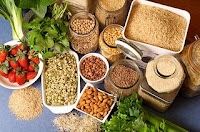Therapy: St. John's wort
Although controversy does exist, many studies suggest that St. John's wort is better than placebo and as effective as antidepressants (tricyclics and SSRIs), with fewer side effects, for mild to moderate depression only. (It is very important to distinguish these forms of depression from major depression, which tends to include a greater number of depressive symptoms and, possibly, thoughts of suicide. For major depression, prescription medications and other therapies are a must.)
Talk with your doctor if you're considering trying St. John's wort; this herb has many potential drug interactions. Also, St. John's wort must not be combined with antidepressant medications. Psychotherapy should always be included in treatment for all forms of depression.
Evidence: Randomized controlled trials, review articles, and meta-analyses. Not all studies have had favorable results.
Therapy: Relaxation techniques, Valerian rootUp to 80 percent of people with insomnia can improve their sleep by learning to relax. Sleep-promoting techniques include progressive relaxation (a process that involves tensing and then releasing each muscle group in your body), meditation, yoga, guided imagery, self-hypnosis, and biofeedback.
Valerian, a mildly sedating botanical, can help you fall asleep faster and improve the quality of your sleep. Valerian combined with lemon balm and hops has yielded positive results as well. It may take one to two weeks to feel the effects. Valerian should not be used with sleeping pills, particularly barbiturates. Limit your use to six weeks or less until long-term safety information is available.
Evidence: Relaxation: Meta-analysis, review articles, and clinical savvy. Relaxation techniques, along with other behavioral changes, are considered first-line therapy for sleeping difficulties. Valerian: Randomized controlled trials. Trials to date have been short-term; there is no scientific information about the safety of using valerian for extended periods of time.
Insomnia
Migraine HeadachesTherapy:
FeverfewFeverfew may be worth a try for many migraine sufferers, particularly those who have used prescription medications and have either not had success with them or not been able to tolerate the many side effects. Look for feverfew standardized to contain at least 0.2 percent parthenolide, the active component thought to be responsible for reducing migraines and their symptoms. (The potency of feverfew varies tremendously from product to product, depending on where the herb was grown.)
Evidence: Randomized controlled trials and case reports. Several studies comparing feverfew with placebo have shown benefit in reducing the number of migraines over time and the symptoms associated with each headache.
Alcoholism, Smoking, and Other Addictions
Therapy: Acupuncture
Acupuncture for addictions may be most effective when combined with behavioral modification and, at times, medication. Endorphins released during acupuncture treatments may help reduce cravings and withdrawal symptoms. Auricular (ear) acupuncture may be particularly useful for narcotics and cocaine addiction.
Evidence: Consensus statement. Two subsequent review articles, however, concluded that there was no difference between real and sham acupuncture, in which needles are applied randomly. My bottom line: Acupuncture seems effective, and it can't hurt.
Alzheimer's DiseaseTherapy: Ginkgo biloba
Some experts feel that ginkgo is an excellent alternative to medication because it appears to have fewer side effects and costs less. While there are flaws to some of the research and not all trials have reached a positive conclusion, the evidence that ginkgo may improve thinking and memory in people with Alzheimer's has been highly promising.
Ginkgo is best if taken at the early stages of Alzheimer's. It may also be considered as a preventive measure if you have a family history of the disease. Ginkgo should not be used if you take a blood thinner (like warfarin) or a class of antidepressants called monoamine oxidase inhibitors (MAOIs).
Evidence: More than 40 randomized controlled trials -- even some comparing ginkgo with standard medications -- and several review articles.
AsthmaTherapy: Omega-3 fatty acidsEarly studies suggest that taking fish oil or alpha-linolenic acid may help ease asthma symptoms and improve lung function. I recommend dietary sources of omega-3s: eat fish, walnuts, and flaxseed while decreasing foods rich in omega-6s (e.g., meat, egg yolks, and certain oils) and trans-fatty acids. Use dietary measures as part of a comprehensive plan, including medication and breathing exercises.
Evidence: Epidemiologic, small randomized controlled trials, and review articles.
High Blood PressureTherapy: MeditationResearch shows that regular meditation practice can help lower blood pressure and keep it down. Biofeedback, qi gong, massage, and self-hypnosis have also been shown to help treat high blood pressure. Be sure to eat foods rich in calcium, magnesium, and potassium as well.
Evidence: Randomized controlled trials and meta-analyses. Many (but not all) studies have shown positive results.
High Cholesterol
Therapy: Soy, fiberBoth soy and soluble fiber are essential for lowering cholesterol. The American Heart Association recommends consuming at least 25 grams of soy protein per day (if you have a high risk of breast cancer, talk with your doctor first). Aim for at least 25-30 grams of fiber per day and eat plenty of fruits, vegetables, whole grains, and nuts.










No comments:
Post a Comment